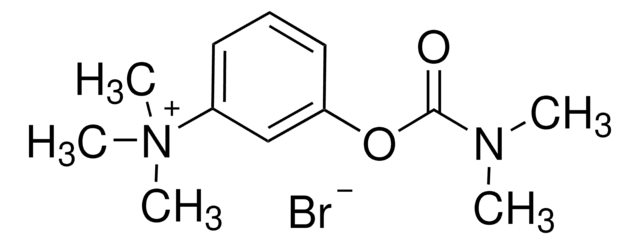N0500000
Neostigmine bromide
European Pharmacopoeia (EP) Reference Standard
Synonym(s):
3-(N,N-Dimethylcarbamoyloxy)-N,N,N,-trimethylanilinium bromide, Prostigmine
About This Item
Recommended Products
grade
pharmaceutical primary standard
API family
neostigmine
manufacturer/tradename
EDQM
application(s)
pharmaceutical (small molecule)
format
neat
storage temp.
2-8°C
SMILES string
[Br-].CN(C)C(=O)Oc1cccc(c1)[N+](C)(C)C
InChI
1S/C12H19N2O2.BrH/c1-13(2)12(15)16-11-8-6-7-10(9-11)14(3,4)5;/h6-9H,1-5H3;1H/q+1;/p-1
InChI key
LULNWZDBKTWDGK-UHFFFAOYSA-M
Gene Information
human ... ACHE(43)
Looking for similar products? Visit Product Comparison Guide
General description
Application
Biochem/physiol Actions
Packaging
Other Notes
Signal Word
Danger
Hazard Statements
Precautionary Statements
Hazard Classifications
Acute Tox. 1 Inhalation - Acute Tox. 2 Dermal - Acute Tox. 2 Oral - Eye Irrit. 2 - Resp. Sens. 1 - Skin Irrit. 2 - Skin Sens. 1 - STOT SE 3
Target Organs
Respiratory system
Storage Class Code
6.1A - Combustible acute toxic Cat. 1 and 2 / very toxic hazardous materials
WGK
WGK 3
Flash Point(F)
Not applicable
Flash Point(C)
Not applicable
Choose from one of the most recent versions:
Certificates of Analysis (COA)
Sorry, we don't have COAs for this product available online at this time.
If you need assistance, please contact Customer Support.
Already Own This Product?
Find documentation for the products that you have recently purchased in the Document Library.
Our team of scientists has experience in all areas of research including Life Science, Material Science, Chemical Synthesis, Chromatography, Analytical and many others.
Contact Technical Service








